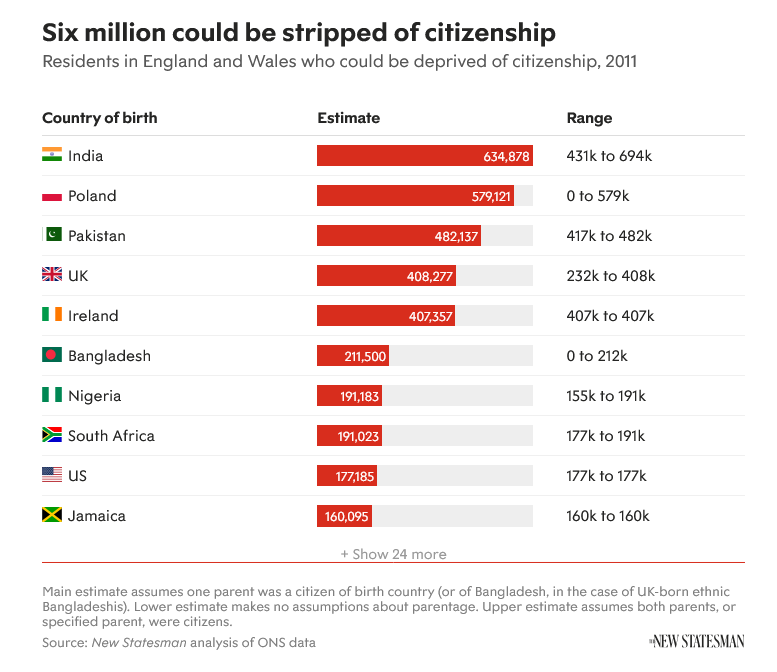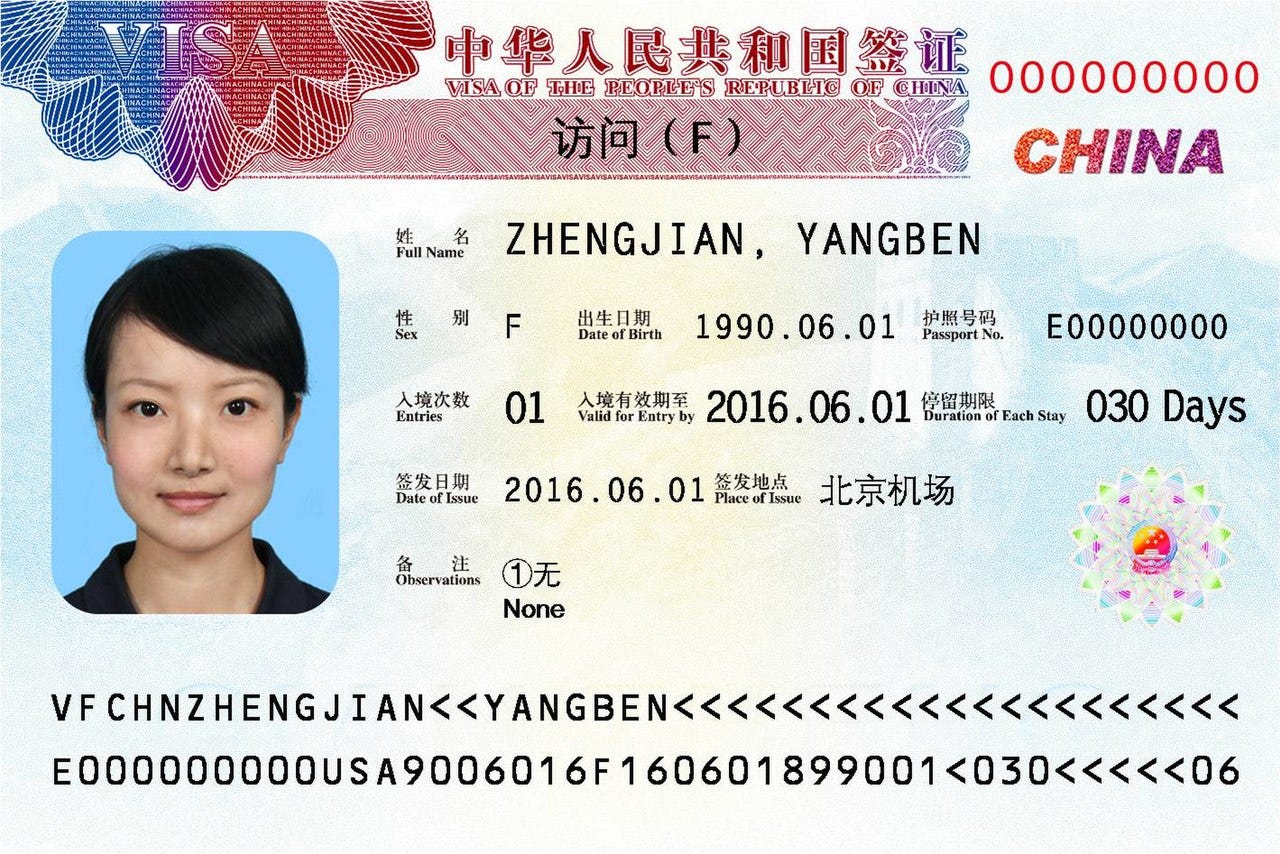By Alex C.
One of the chief complaints among non-nationalists is that we could never possibly send people back to their countries of origin or ancestral homelands because they are no longer citizens of those countries. It is assumed that because the West has given up all semblance of ethnic preference in immigration and integration policy that all other countries in the world have taken the same approach. In previous posts White Papers has tackled these concerns.
I am reminded of the recent article by fellow White Papers contributor Joseph Bright where he pointed out that 50% of Asians in Britain—which in their cultural framing includes Pakistanis and Indians—and 40% of Africans/Blacks in the United Kingdom retain citizenship in their ethnic homelands and could, therefore, be denaturalized in the United Kingdom and deported if they had committed serious crimes.

This fantastic news got me thinking, though. What about the roughly 66% of non-British people aged 13-34 who want to leave the United Kingdom or are considering doing so?
Or the 45% of non-White Americans who would leave the country if possible?
What about the paid remigration programs for people that White Papers has so adamantly pushed for and nations like Sweden are now exploring? What are the options for those who would go but don’t appear to have the ability?
It turns out that a great deal of the world has not abandoned ethnic and national origin preferences in the way that the Western world’s elite and institutions have done over the past 60 years. I can say with relief that, luckily for us, there are many opportunities for voluntary repatriation which exist for people who live in the West and would like to return to their home countries or may be enticed to do so through the financial incentive programs for remigration that we continue to advocate for.
India and Indians are the first group that worth examining. After all, there are nearly 5.2 million Indians residing in the United States, 2 million Indians in the United Kingdom, and 800,000 people of Indian origin or extraction in Australia. There are millions more Indians spread across the Western world, but I figure that these large groups are demonstrative enough for my example!
In 2022 Indians and Pakistanis in the United Kingdom rioted for more than a week in Leicester in the United Kingdom.
25 police officers were injured and the unrest eventually spread to Birmingham. The cause of these riots? Indian beat Pakistani in the 2022 Asian cup.
In the United States Indian workers undermine competitive wages for US tech sector workers and lest we forget, they crashed a cargo ship into the Francis Scott Key Bridge in Baltimore. Alright, those crewmen may not have been immigrants in the US but they certainly demonstrate one reason we may not want more Indians to flood into this country.
It may disconcert a fellow nationalist to learn that India does not have a policy of dual citizenship. The Indian constitution explicitly forbids dual citizenship. This means that millions of Indians in the West who have become naturalized ‘Americans’ ‘Britons’ or ‘Germans’ or been born to Indian parents have no way to return to their ancestral homeland either by necessary deportation (in the case of criminals and frauds) or voluntary remigration schemes. Except it doesn’t!
India has created something known as Overseas Citizenship of India (OCI). This unique diaspora program allows the child, grandchild, or great-grandchild of any former Indian citizen to live, work, own non-agricultural land, and permanently reside in India. Indian courts have held that OCI holders are allowed admission to universities on the same footing as Indian citizens and research has shown that the OCI program radically reduces the costs of moving to and settling in India for returning diaspora.
Overseas Citizenship of India grants ethnic Indians near total access to economic and social life in their ancestral homeland.
And what of the Pakistanis with whom the Indians battled in the streets of Britain or the 700,000 Pakistanis in the United States? As a side note, Google “Pakistani American fraud” and you’ll get dozens of hits showing how Pakistani “Americans” defraud the American taxpayer for tens and hundreds of millions of dollars each year.
Happily (for us) Pakistan also operates an ethnicity/origin-based diaspora settlement scheme known as the Pakistan Origin Card (POC).
The POC can be acquired by any person of Pakistani origin whose parents, grandparents, siblings, uncles, or aunts were or are currently Pakistani citizens. This expansive coverage means that virtually every Pakistani in then Western world is eligible for the POC and therefore to be forcibly repatriated to Pakistan (in the case of criminals) or in the case of voluntary remigration to resettle there under future repatriation schemes hopefully carried out by Western governments.
These two groups are not the only large demographic groups in the West that have special ability to return to their homelands.
In 2018 China modified its visa laws to allow any foreign citizen of Chinese heritage to gain a residency visa to China for a period of five-years, thus allowing Western born Chinese the ability to return to their homeland.
And, because of current Chinese naturalization laws, these returnees would be able to acquire Chinese citizenship before their special Chinese heritage visas expire or need to be renewed. With more than 1.4 million Chinese in Australia, 5.5 million Chinese in the United States, 500,000 Chinese in Britain, and more than a million-plus Chinese in mainland Europe it is this program that offers that will expand remigration opportunities to virtually all Chinese in the West.
There are also non-countries where remigration cooperation between the West and themselves would be explicitly beneficial to that non-Western society. In particular I am thinking of Korea and Japan, both of which have ethnicity-based visa programs for their kin abroad and both of which are entering periods of steep demographic decline.
The Japanese have a Japanese descent (Nikkei) visa that applies to anyone who is the child or grandchild of a Japanese citizen. The visa is also applicable to the spouse of a Japanese national. The visa goes so far as to extend to those of third generation descent and perhaps beyond. Despite this visa being widely available there is little evidence that knowledge of it is widespread among ethnic Japanese living in the West, and there are a great many.
More than 1.65 million Japanese reside in the United States, some 150,000 in Canada, and a further 3 or so million spread across the rest of the world. With Japan projected suffer a catastrophic population implosion from 126 million today to 106 million by 2050, 87 million by 2070, and less than 50 million after 2100 it is critical that the young Japanese diaspora return home to avert this disaster. The median age in Japan now exceeds 50 years old while the average age of a Japanese American is just 36 years old. Japanese and Asian Americans also have a higher marriage rate compared to other Americans and compared to their Japanese brethren in the homeland. Marriages, more than any economic or social policy incentive, are what lead to children and therefore higher fertility rates. Birth rates among married women are more than double that among unmarried women, and remain relatively stable over time while unmarried birth rates often experience crashes, according to the Institute for Family Studies.
Then there is South Korea. The country is in the exact same demographic predicament as Japan and also offers ethnicity-based visas to its diaspora. The F-4 visa issued by South Korea allows for those with Korean parents and grandparents to settle in the country for 5 years and renew the visa every 5 years so long as they maintain employment and good standing.
With more than 7 million people in its diaspora this visa present an opportunity for South Korea to reverse its own demographic decline. With more than 2.6 million Koreans in the United States, 250,000 in Canada, and 160,000 in Australia the West serves as the greatest source of potential Korean returnees.
Without remigration from the West to Korea the Korean population is expected to fall from 52 million today to some 38 million by 2070. Koreans in the West could radically reverse this process. While the median age in South Korea is nearly 46 years old the media age of a Korean American is population is young and growing. Like Japanese Americans they have a higher marriage rate and therefore larger rates of family formation that would be massively beneficial for an aging and gender divided South Korea.
These four countries represent just a small number of those I was able to discover have vast diaspora outreach and resettlement opportunity programs. It would be remiss of our nationalist movement if we were not aware of these things. We must bring them to the public debate so that whenever a smarmy leftist or holier-than-though center right conservative says “Well, where will THEY go?” we have the answer!
Support our mission to take on more writers and contributors:
Zelle: whitepapersinstitute@protonmail.com
Buy us a coffee: https://www.buymeacoffee.com/wppi
Linktree: https://linktr.ee/wppi
Snail Mail: White Papers Policy, PO Box 192, Hancock, MD 21750S








